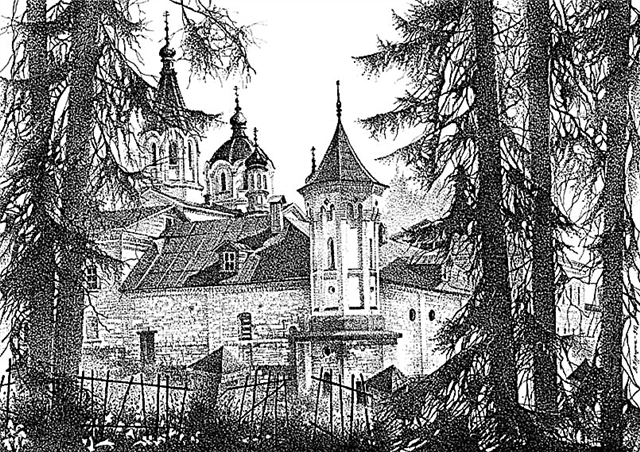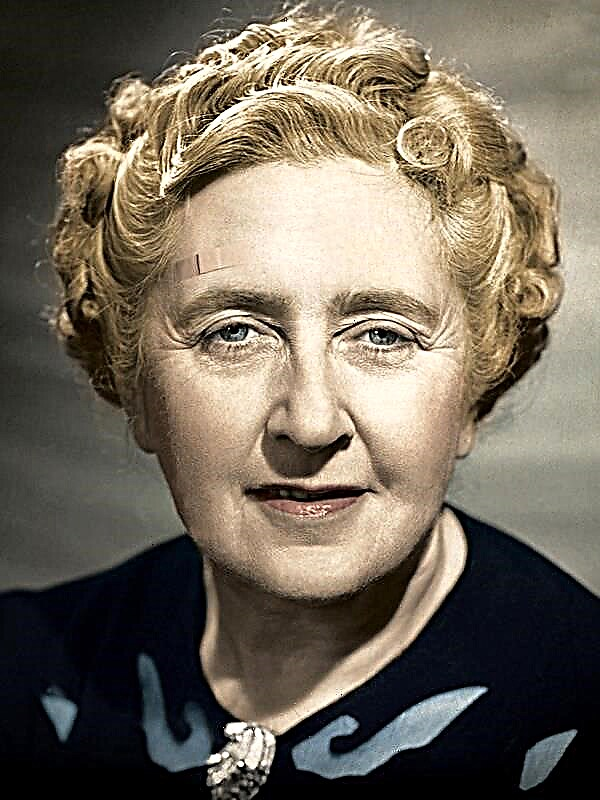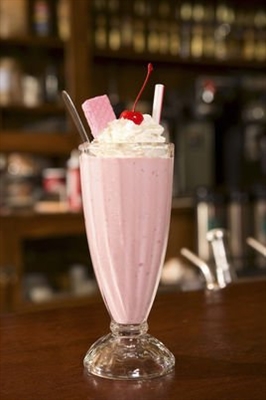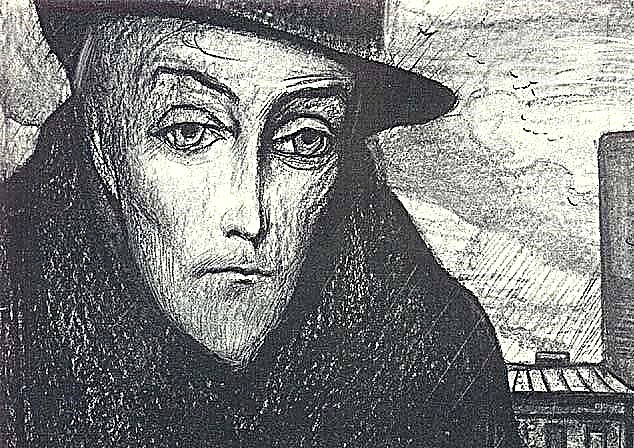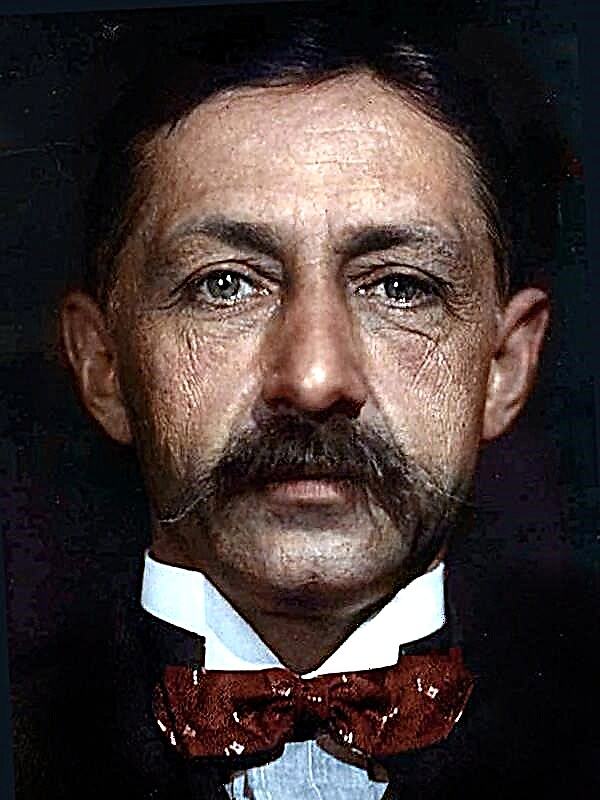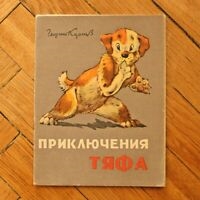1
Spring 1624. The army of the Swedish king collects soldiers to march on Poland. Feldfebel and the recruiter recognize only war as the founder of public order and civilization. Where there is no war, what morality is there: everyone wanders wherever he wants, says what he wants, eats what he wants - no order, no ration, no accounting!
Two guys are rolling in the van of mother Courage, the second-Finnish regiment's martyr. Here's what she sings: “Hey, commander, give a halt sign / Take care of your soldiers! / Succeed in battle, start it up first / Infantry will change boots. / And lice feed under the buzz of guns, / And live, and turn to dust - / Pleasant to people, if people / At least in new boots. / Hey, Christians, the ice is melting, / The dead are sleeping in a grave haze. / Get up! It’s time for everyone to go camping, / Who is alive and breathing on the earth! ”
She was born in Bavarka, and her real name was Anna Fierling, and she received the nickname Courage for the fact that she never threw her goods van under bombs or bullets. Her children - sons and a dumb daughter, Catherine - are true children of the war: each has his own name, and their fathers - soldiers of different armies who fought under the banners of different faiths - all have already been killed or gone to an unknown location.
The recruiter is interested in her adult sons, but Courage does not want them to join the soldiers: he feeds on the war, but does not want to pay the war rent! She begins to guess and, to frighten the children, arranges so that each of them receives a piece of paper with a black cross - a mark of death. And fraud becomes an ominous prophecy. Now, the recruiter deftly takes her eldest son Eilif, while mother Courage bargains with the sergeant major. And there's nothing to be done: you have to keep up with your regiment. Her two remaining children are harnessed to the van.
2
In the years 1625-1626. Mother Courage travels around Poland in a convoy of the Swedish army. So she brought a capon to the commander’s cook and skillfully bargains with him. At this time, the commander in his tent takes her son, the brave Eilif, who performed a heroic feat: fearlessly repulsed several bulls from the superior forces of the peasants. Eilif sings about what soldiers say to their wives, mother Courage sings another verse - about what wives say to soldiers. Soldiers talk about their courage and luck, their wives talk about how little exploits and rewards mean to those who are doomed to death. Mother and son are glad to have an unexpected meeting.
3
Three more years of war passed. The peaceful picture of the bivouac of the battered Finland regiment is disturbed by the sudden advance of the imperial troops. Mother Courage is in captivity, but she manages to replace the Lutheran regimental banner above her van with a Catholic one. Once there, the regimental priest manages to change the pastoral dress to the clothes of the assistant market leader. However, the imperial soldiers track and grab the youngest son, Courage, a simpleton Schweizerkas. They demand that he give out the regimental treasury entrusted to him. Honest Schweizerkas cannot do this and must be shot. To save him, you have to pay two hundred guilders - everything that mother Courage can help out for her van. It is necessary to bargain: is it possible to save the life of a son for 120 or for 150 guilders? It is impossible. She agrees to give everything, but it is too late. The soldiers bring the body of her son, and mother Courage should now say that she does not know him, but she needs to save at least her van.
4
Song of the Great Surrender: “Someone tried to move the mountains, / Remove a star from the sky, catch the smoke with your hand. / But such soon became convinced / That these efforts are not for him. / And the starling sings: / Break the year, / We must walk in a row with everyone, / We must wait, / Better to keep silent! ”
5
Two years have passed. War captures new spaces. Not knowing the rest, mother Courage with her van passes through Poland, Moravia, Bavaria, Italy and again Bavaria. 1631. Tilly's victory at Magdeburg costs mother Courage of four officer shirts, which her compassionate daughter breaks into bandages for the wounded.
6
Near the city of Ingolstadt in Bavaria, Courage is present at the funeral of the commander of the imperial troops Tilly. The regimental priest, her assistant, complains that in this position his abilities are lost in vain. Marauder soldiers attack the dumb Catherine and severely smash her face. 1632
7
Mother Courage is at the pinnacle of business success: the van is full of new goods, and a bunch of silver thalers are on the owner’s neck. “Still, you won’t convince me that war is shit.” It destroys the weak, but it is hard for them in peacetime. But she feeds her properly.
8
In the same year, the Swedish king Gustav Adolf was killed at the Battle of Lutzen. The world has been declared, and this is a serious problem. The world threatens mother Courage ruin. Eilif, the brave son of mother Courage, continues to rob and kill peasants, in peacetime these feats were considered unnecessary. A soldier dies like a robber, but how much did he differ from him? The world, meanwhile, was very fragile. Mother Courage again harnesses to her van. Together with the new assistant, the former cook of the commander, who contrived to replace the too kind-hearted regimental priest.
9
For sixteen years the great war for faith has been going on. Germany lost a good half of its inhabitants. In the lands that once flourished, hunger reigns now. Wolves roam the burnt cities. In the autumn of 1634 we meet Courage in Germany, in the Pine Mountains, away from the military road along which the Swedish troops are moving. Things are going badly, you have to beggar. Hoping to beg for something, the cook and mother Courage sing a song about Socrates, Julia Caesar and other great men who did not benefit from their brilliant mind.
A cook with virtues is not a lot. He offers to save himself, leaving Catherine to the mercy of fate. Mother Courage leaves him for his daughter.
10
"How good it is to stay warm / When the winter has come!" - they sing in a peasant house. Mother Courage and Catherine stop and listen. Then they continue on their way.
11
January 1636. Imperial troops threaten the protestant city of Halle, the end of the war is still far. Mother Courage went to the city to take valuables from hungry citizens in exchange for food. The besiegers, meanwhile, make their way in the night darkness to massacre the city. Catherine can not stand it: climbs on the roof and beats the drum with all his might until the besieged hear it. Imperial soldiers kill Catherine. Women and children are saved.
12
Mother Courage sings a lullaby over her dead daughter. That war took all her children. And soldiers pass by. “Hey, take me with you!” Milf Courage drags his wagon. “The war will succeed with the success of the variable / One hundred years will hold out completely, / Although an ordinary person / Does not see joy in the war: / He eats shit, he is dressed poorly, / He is ridiculous to his executioners. / But he hopes for a miracle, / Until the campaign is completed. / Hey, Christians, the ice is melting, / The dead are sleeping in a grave haze. / Get up! It’s time for everyone to go camping, / Who is alive and breathing on the earth! ”




